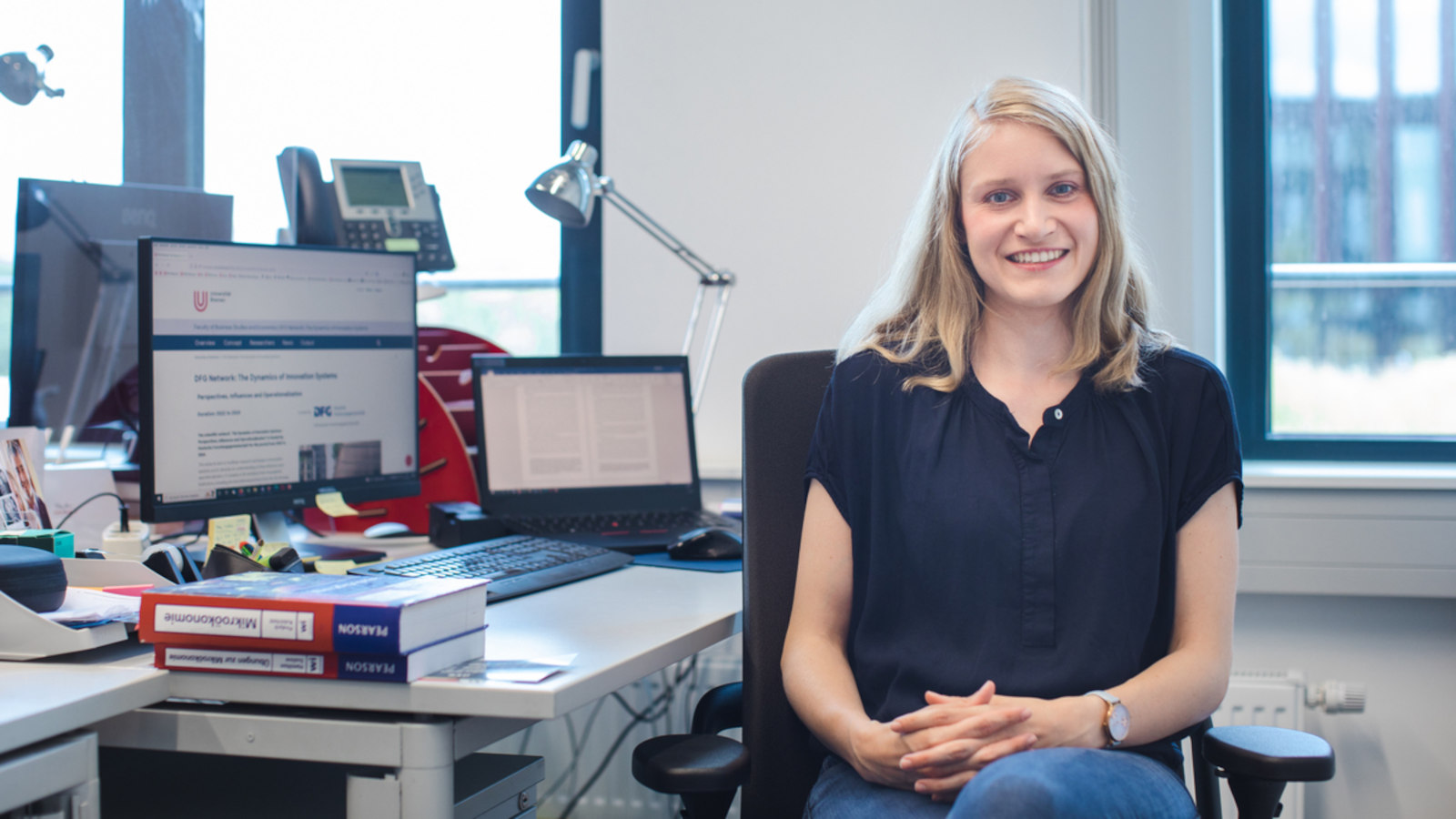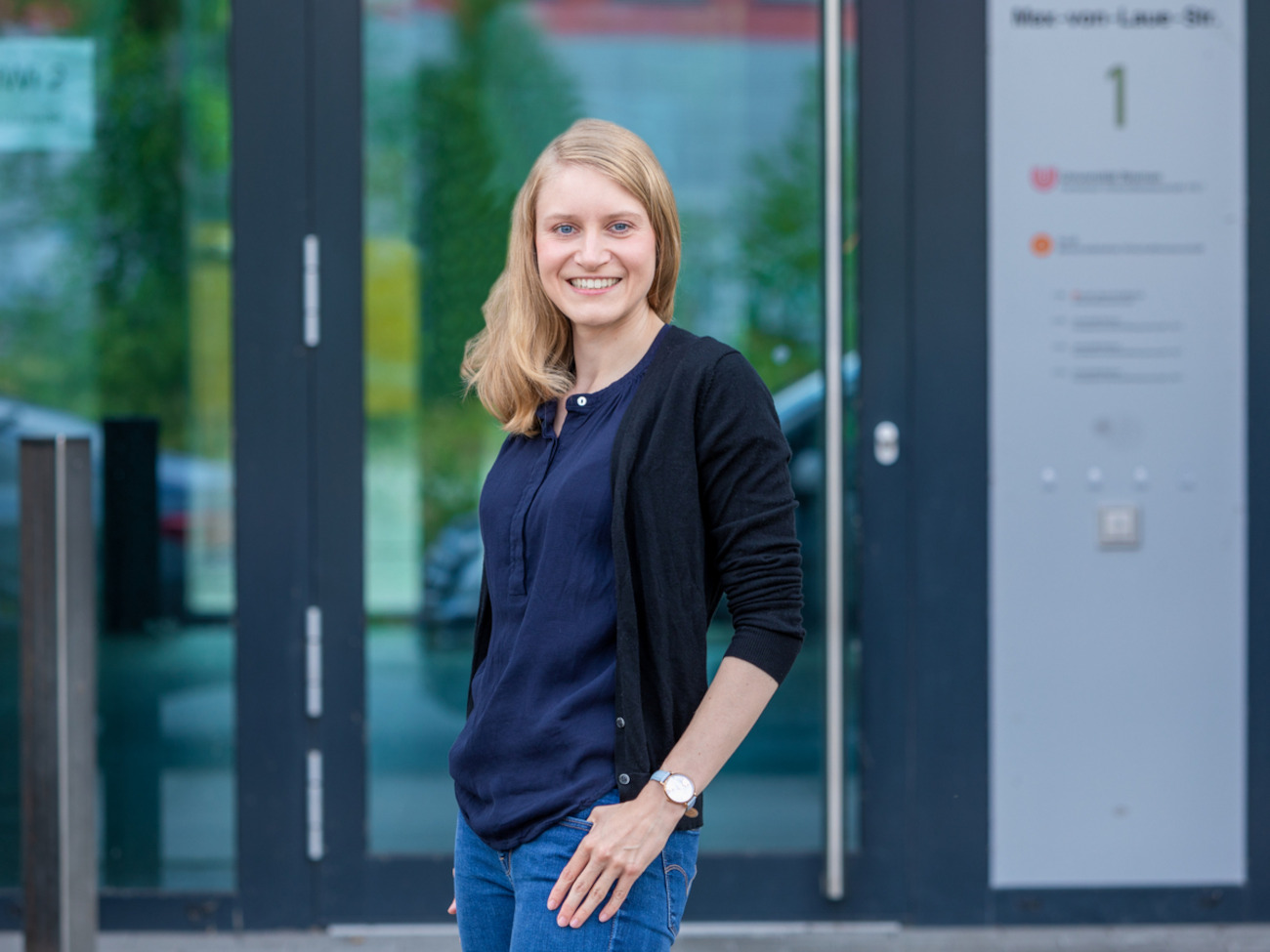
© Matej Meza / Universität Bremen
The East German Economy as a Common Thread
The academic mid-level sector in focus: Ann Hipp from the research group “Innovation and Structural Economics”
Looking around, getting around, seizing opportunities, and letting coincidences happen – that’s the career path of junior researcher Ann Hipp. And yet there is a common thread: her interest in the peculiarities of the East German economy should one day lead the enthusiastic economist to a professorship.
Chemnitz – Halle – Dresden – Mannheim – Bremen; Germany – Finland – France – Japan: Ann Hipp has got around quite a bit in the world. But this isn’t about vacationing, it’s about a research career as an economist. Bachelor, master, doctorate, now habilitation: the 33-year-old from Schmalzerode – a small village in Saxony-Anhalt 90 kilometers east of Magdeburg – is pursuing a single-minded plan. But, as so often in life, this was of course not her original plan. “Random places” are what she calls the stops along the way: “I’ve always tried to take advantage of opportunities as they’ve come up, and I’ve always been curious about what research is being done at other institutes and universities and how.”
Back to the beginning: Ann Hipp attended secondary school in the beautiful town of Lutherstadt Eisleben, the nearest town to her home. Various courses were offered there – including languages, economics, law, politics – “and I was always very interested in economics. I got hooked on the subject matter.” She became interested in the development of companies and industries at an early age: “The area I come from, after all, is in the middle of Germany, so it’s actually ideal. I have always wondered why, in spite of that, so little works well there economically. And the fact that there is a striking East-West difference in the German economy also quickly became apparent to me.”

© Matej Meza / Universität Bremen
Ann Hipp’s interest and research still revolve around this topic today. Consequently, she studied business studies and economics at TU Chemnitz: “I was kind of drawn to Saxony. The economy had functioned quite well there under socialism, better than in other regions of East Germany. I wanted to know why that was.” She completed her compulsory student internship at the Leibniz Institute for Economic Research (IWH) in Halle – a crucial milestone, because it was there that she met Professor of Economics Jutta Günther, in whose research group she worked. She was to meet the current President of the University of Bremen again.
The Photovoltaic Industry as Her First Research Topic
Ann Hipp’s bachelor’s thesis was so interesting that she was even allowed to present it at the Technology Transfer Conference in Augsburg in 2011. “In terms of content, it was about how collaborations come about in the photovoltaic industry.” A topic she later took up again at TU Dresden. She wrote her master’s thesis there, and then her dissertation, and the latter again dealt with the photovoltaic industry: “At the time, this new type of power generation was a beacon of hope for the East German economy. There had been a vehement research-based search for connection technologies that built on the existing knowledge of the people working there.”
Although the market was massively promoted, the calculation did not work out – German solar cell manufacturers went bankrupt and disappeared from the market for the most part. Ann Hipp explained why this happened in her cumulative doctoral dissertation, which consisted of three large studies. “There were many innovations here that also resulted in patents. But at the same time, a global dynamic emerged in the sector; through the flow of knowledge and standardized products, manufacturers in other regions of the world were soon able to produce solar cells and panels just as well – only cheaper. That brought an end to the industrial hope of East Germany,” says the economist, describing the dilemma. The fact that the research results from her work, however, still made it into a leading international scientific publication encouraged Ann Hipp on her further path.
Application Sent from the Australian Outback
In between, she also spent a year on a work-and-travel holiday in Australia, because life isn’t just about work. “Among other things, I spent three months behind the bar in a remote pub in Tasmania, which was quite an experience.” She sent her application to TU Dresden from Sandstone, at that time the only place far and wide with an Internet connection. It was already clear that she wanted to pursue a career as a researcher despite this interruption: “I already knew that while I was writing my bachelor’s thesis.” She gained further experience abroad – then again in connection with research – in Finland and France in 2014 and in Japan in 2018.
“I’ve always been curious about what research is being conducted at other institutes and universities and how.”
Working at the ifo Institute for Economic Research, at the Chair of Marketing and Innovation at the University of Mannheim, and then again at TU Dresden – Ann Hipp took advantage of successive opportunities to broaden her horizons. Then in 2019, she moved to Bremen to join Professor Jutta Günther’s research group “Innovation and Structural Economics.” “I had never lost contact with her because Jutta Günther’s and my research are based on similar questions. And she knew that I had just completed my doctorate. Then, when the Federal Ministry of Education and Research selected the interdisciplinary and cross-regional research project “Obstacles to Modernization in the Economy and Science of the GDR” (Mod-Block-DDR) – for funding, Jutta Günther brought me onto the team.”
In terms of content, this was a topic that was tailor-made for Ann Hipp. After all, some 30 years after German reunification, the cliché was firmly established that in 1990 an efficient capitalist economy had taken over a dismantled and bankrupt socialist system. “That’s not entirely true. There were definitely segments in which the GDR was economically successful. Scientifically and technologically, we also had internationally recognized expertise,” says the young researcher. What the GDR had to contend with were precisely these “modernization hurdles” – a party that intervened too strongly, insufficient performance incentives, a dramatically poor infrastructure, and much more.
“Always with a Fish Sandwich”
The step to Bremen was quite a big one for her. At first, Ann Hipp lived in a five-person shared apartment; then her husband joined her and the couple moved into a house. When a baby came along, Ann Hipp integrated a second, longer “research break” into her life. Time not only for husband and child, but also for her hobbies: music, theater, reading, jogging, and yoga – and trips, best of all, to the Blockland area or to the seaside: “Always with a fish sandwich.”

© Cezanne-Fotografie / AdobeStock
Her habilitation, with which Ann Hipp wishes to achieve her long-term goal of “professorship,” ties in with previous topics: “It is about the transformation of innovation systems. What roles do politics and stakeholders play in this? How do growth developments occur at different levels?” So far, there has been relatively little research on how these systems develop over time. Ann Hipp successfully applied to the Deutsche Forschungsgemeinschaft DFG – German Research Foundation) for a network on the topic of “The Dynamics of Innovation Systems” and will receive funding for three years. “This is now the anchor for my habilitation,” she says happily. “This allows me to exchange ideas with other researchers, advance joint publications, and continually get new impetus for my work.”